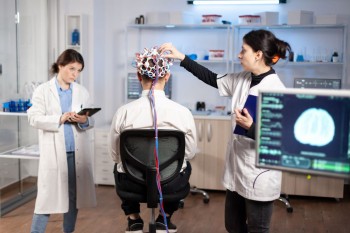
EEG Test in Thane West: An EEG test monitors brain activity to diagnose neurological conditions.
EEG (Electroencephalogram) Test
with Cost in Thane West, Thane in Detail
Introduction
to EEG Test
An
EEG, or Electroencephalogram, is a non-invasive test that records electrical
activity in the brain. This test is essential for diagnosing and monitoring
various neurological disorders, such as epilepsy, sleep disorders, and brain
injuries. Understanding what an EEG entails and how it is performed can help
demystify the process and make it less intimidating for patients.
How
Does an EEG Test Work?
The
EEG test works by detecting electrical impulses in the brain using electrodes
placed on the scalp. These impulses are then recorded as brainwaves, which are
displayed on a computer screen. The different types of brainwaves—such as
alpha, beta, delta, and theta waves—each have their significance, reflecting
various brain activities like alertness, relaxation, or sleep.
The Science Behind EEG
EEG technology relies on the principle that neurons in the brain
communicate through electrical impulses. When these impulses are captured by
the electrodes, they provide a snapshot of the brain's activity, which can
reveal abnormalities indicative of neurological issues.
The Role of Brainwaves
Brainwaves are categorized by their frequency into different types. For
example, alpha waves are associated with relaxation, while beta waves are
linked to active thinking and problem-solving. Abnormalities in these waves can
indicate issues like seizures, tumors, or other brain disorders.
Who
Needs an EEG Test?
EEG
tests are often recommended for individuals experiencing unexplained seizures,
frequent headaches, or symptoms of neurological disorders. They are also used
to evaluate patients with sleep disorders or brain injuries. If your doctor
suspects a neurological condition, an EEG may be a crucial part of your
diagnosis.
Common Medical Conditions Requiring EEG
Conditions like epilepsy, sleep apnea, encephalopathy, and head injuries
are some of the common reasons why an EEG might be necessary. Additionally,
EEGs are used in the diagnosis of brain death and in the monitoring of brain
function during surgery.
When is EEG Recommended?
Doctors recommend an EEG when they need to observe the brain's electrical
activity over time, especially if the symptoms are episodic, like seizures or
fainting spells. It’s also recommended when other diagnostic tests, like MRIs
or CT scans, don’t provide enough information.
Preparing
for an EEG Test
Before
undergoing an EEG test, there are specific guidelines you should follow to
ensure accurate results. These include washing your hair the night before the
test to remove oils that might interfere with electrode placement and avoiding
caffeine or other stimulants that could alter brain activity.
Pre-Test Guidelines
You may be asked to sleep less than usual or stay awake the night before
the test, depending on the type of EEG being conducted. It's also essential to
inform your doctor about any medications you are taking, as some can affect the
results.
What to Expect During the Test
On the day of the test, you will sit in a comfortable chair or lie down.
The technician will place electrodes on your scalp using a special gel to
enhance conductivity. The test is painless, and you will be asked to relax,
possibly close your eyes, and perform simple tasks like deep breathing or
looking at a flashing light.
Types
of EEG Tests
There
are various types of EEG tests, each suited for different diagnostic needs. The
most common are Routine EEG, Ambulatory EEG, Video EEG Monitoring, and Sleep
EEG. Each type has a specific purpose and its own benefits.
Routine EEG
A Routine EEG typically lasts 20 to 40 minutes and is conducted in a clinic
or hospital setting. It is used to capture a snapshot of brain activity and is
often the first step in diagnosing neurological conditions.
Ambulatory EEG
An Ambulatory EEG allows for prolonged monitoring of brain activity over 24
hours or more. This type is beneficial for detecting intermittent symptoms that
might not appear during a shorter test.
Video EEG Monitoring
Video EEG Monitoring combines the EEG test with video recording. This is
particularly useful for diagnosing epilepsy, as it allows doctors to correlate
brain activity with physical symptoms captured on video.
Sleep EEG
A Sleep EEG is performed while the patient is asleep. It’s often used to
diagnose sleep disorders like narcolepsy or to monitor brain activity during
different sleep stages.
The
EEG Test Procedure
The
procedure for an EEG test is straightforward and non-invasive. First, the
technician will measure your head and mark the spots where the electrodes will
be placed. These electrodes are attached to your scalp with a conductive paste.
You will then be asked to sit or lie down while the test is conducted.
Step-by-Step Guide to the Procedure
Electrode Placement: The technician measures your head and applies the
electrodes.
Test Begins: You are asked to relax, and the machine starts recording
brainwaves.
Simple Tasks: You may be asked to perform tasks like deep breathing or looking
at a light.
Test Ends: After about 30 to 60 minutes, the electrodes are removed, and
you can go about your day.
Duration of the EEG Test
A standard EEG test usually takes 20 to 60 minutes, depending on the type
of EEG and the specific condition being investigated.
EEG
Test Cost in Thane West, Thane
The
cost of an EEG test in Thane West can vary depending on several factors. On
average, you can expect to pay anywhere from ₹2,000 to ₹8,000, depending on the
type of EEG test and the facility where it is conducted.
Factors Influencing the Cost
The cost of an EEG test can be influenced by the type of EEG (e.g.,
Routine, Ambulatory, Video Monitoring), the duration of the test, the
technology used, and the expertise of the neurologist interpreting the results.
Average Cost of EEG Test in Thane West
In Thane West, the average cost for a Routine EEG test is around ₹2,500.
For more specialized tests like Ambulatory EEG or Video EEG Monitoring, the
cost can go up to ₹7,000.
Best EEG Test Centre in Thane
West, Thane
Looking
for a reliable EEG test centre in Thane West? This top-rated facility offers
accurate and efficient EEG testing with advanced equipment and experienced
professionals, ensuring you get precise results and quality care.
Affordable
EEG Test Centre in Thane West, Thane
Mdscans
centre in Thane West offers affordable EEG tests, providing accurate brain wave
monitoring for diagnosing neurological conditions. With experienced staff and
modern equipment, it ensures reliable results and accessible care for all.
EEG
Test Services in Thane West, Thane
Offering
reliable EEG test services in Thane West, Thane, our facility provides accurate
brain wave monitoring for diagnosing neurological conditions. With
state-of-the-art equipment and experienced technicians, we ensure precise and
comfortable testing in a convenient location.
Finding the Right EEG Test Centre
Choosing
the right EEG test centre is crucial for obtaining accurate results. Thane West
has several reputable centres equipped with the latest EEG technology and
experienced neurologists.
Top EEG Centres in Thane West
Some of the top EEG centres in Thane West include Pulse Advance Scan
Centre, PC Diagnostics (Invicta Diangnotic LLP), and Jupiter Hospital. These centres
are known for their state-of-the-art facilities and expert staff.
Benefits
of EEG Test
EEG
tests offer several benefits, particularly in diagnosing and managing
neurological conditions. They provide a non-invasive way to monitor brain
activity and can be crucial in detecting disorders that other tests might miss.
Advantages of EEG in Neurological Assessments
One of the primary advantages of an EEG is its ability to detect abnormal
brain activity, which can help diagnose conditions like epilepsy, sleep
disorders, and brain injuries. The test is also useful in monitoring the
effectiveness of treatments for these conditions.
Limitations of the EEG Test
While EEGs are highly useful, they do have limitations. For example, an EEG
may not detect abnormalities that are deep within the brain or that occur
infrequently. In such cases, additional tests like MRI or CT scans may be
necessary.
Conclusion
EEG
tests are a crucial tool in the diagnosis and management of various
neurological conditions. Whether you're experiencing unexplained symptoms or
need to monitor an ongoing condition, an EEG can provide valuable insights into
your brain’s activity. In Thane West, Thane, several top-rated centres offer
EEG tests with state-of-the-art equipment and experienced professionals,
ensuring you receive accurate and reliable results.
FAQs
about EEG (Electroencephalogram) Test with Price in Thane West, Thane
1.
Is EEG Test Painful?
No,
an EEG test is painless. The electrodes only pick up electrical activity and do
not emit any electricity, so you won’t feel anything during the test.
2. How Long Does it Take to Get EEG Results?
It typically takes a few days to a week to receive the results of an EEG
test. Your neurologist will review the brainwave patterns and provide a
detailed report.
3. Can You Eat Before an EEG Test?
Yes, you can eat before an EEG test unless instructed otherwise by your
doctor. However, it’s advisable to avoid caffeine and other stimulants as they
can affect the results.
4. Does Insurance Cover EEG Tests?
Most insurance plans cover EEG tests, especially if they are deemed
medically necessary. It’s always a good idea to check with your insurance
provider before scheduling the test.
5. How Accurate is an EEG Test?
EEG tests are generally accurate in detecting abnormal brain activity.
However, their accuracy can depend on factors like the duration of the test and
the specific condition being monitored.
(0)
Login to continue



